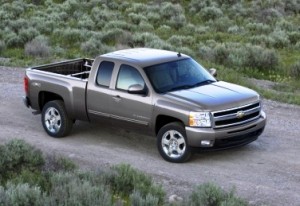
Despite some "challenges," automakers see good news ahead - even in the pickup segment, where models like the Chevy Silverado gained ground.
Despite some “challenges in our industry,” automakers hailed the generally strong pace of sales, last month, billing it as a sign that the nation’s economy is firmly on the road to recovery.
But industry analysts will be watching to see if automakers can avoid yet another incentive war, rebates and other givebacks clearly helping prop up the market the last two months.
The seasonally adjusted annual rate, or SAAR, for light vehicle sales actually dropped back just slightly to 11.2 million units during April but carmakers didn’t seem to mind.
There was a general consensus that the economic recovery is genuine and sales will continue to improve. At Toyota, which saw a 24.4% jump in April sales, vice president Bob Carter said the signs clearly indicate that the economy is on the mend and interest among consumers in new vehicles is on upswing.
That position was echoed by Brian Carolin, senior vice president, Sales & Marketing for Nissan North America, which chalked up a 35.5% increase over the recession depressed figures from April, 2009.
“Customers are coming back into the market,” he said, adding, “Though there are still challenges in our industry, the market is showing signs of life, and Nissan and Infiniti vehicles are resonating with more consumers every day.”
April marked the Nissan division’s seventh consecutive month with a year-over-year sales increase. For Ford, it brought the eighteenth increase out of the last 19 months. Ford senior economist Emily Kolinski Morris said the current economic environment, including a 3.2% increase in the gross domestic product, indicates the recovery is underway. Consumer confidence also is improving, she said.
“Consumers of luxury goods are clearly buying again,” said Audi of America President Johan de Nysschen. “As these buyers return to the car market they are seeking out cars representing substance, leading-edge engineering and sophisticated styling.”
Audi reported a solid month for April, its sibling division, Volkswagen, meanwhile, was up 42%, year-over-year.
“As we continue to gain positive momentum, we believe that our continued new product introductions will deliver even greater growth in the months ahead,” said Mark Barnes, Chief Operating Officer, Volkswagen of America, Inc,.
Overall, April was a pretty good month for the industry, even smaller makers, such as Subaru, Mazda, Hyundai, and Kia all posted double-digit increases in sales. BMW and Mitsubishi also posted increase but only in single digits. Only Suzuki, which appears to have slid into a deepening sales funk, showed numbers that were actually worse than last year.
Jesse Toprak, an analyst with TrueCar, said the April sales results represent a dramatic turnaround from the spring of 2009. “A year ago everybody’s was trying to figure out who was going to be left,” he said.
One surprise came from Toyota. Though the maker had a solid month, it didn’t meet some bullish forecast, which suggested the Japanese company would not only overcome its ongoing safety-related problems but surge to the top of the sales charts thanks to its hefty incentives. But GM and Ford did better than expected – relying, of course, on givebacks of their own.
GM officials actually reported cutting their incentives by about $100 a vehicle for the month, but the cash outlays are still hefty and industry observers are wary that the result could be the sort of profit-gobbling giveback campaigns makers promised to foreswear during the worst months of the current recession.
The good news, analysts say, is that good product seems to be moving the market as much as incentives. Indeed, all-new models like the Chevrolet Equinox accounted for roughly a quarter of GM sales in April.
Ken Czubay, Ford vice president of sales, service and marketing, said Ford’s new Transit Connect van is proving enormously popular, particularly with fleet buyers.
In fact, April showed that conventional wisdom can often prove off-track in the American auto market. While recent media coverage would suggest that small passenger cars are taking over in a market long focused on big trucks, there are signs of life in the pickup segment, especially among domestic makers, after a long slump.
That would be good news for Detroit, where models like the Ford F-150 have long propped up balance sheets. But after years of trying to crack the segment, import makers Nissan and Toyota have found they simply can’t grow beyond niche status in the full-size pickup market.
